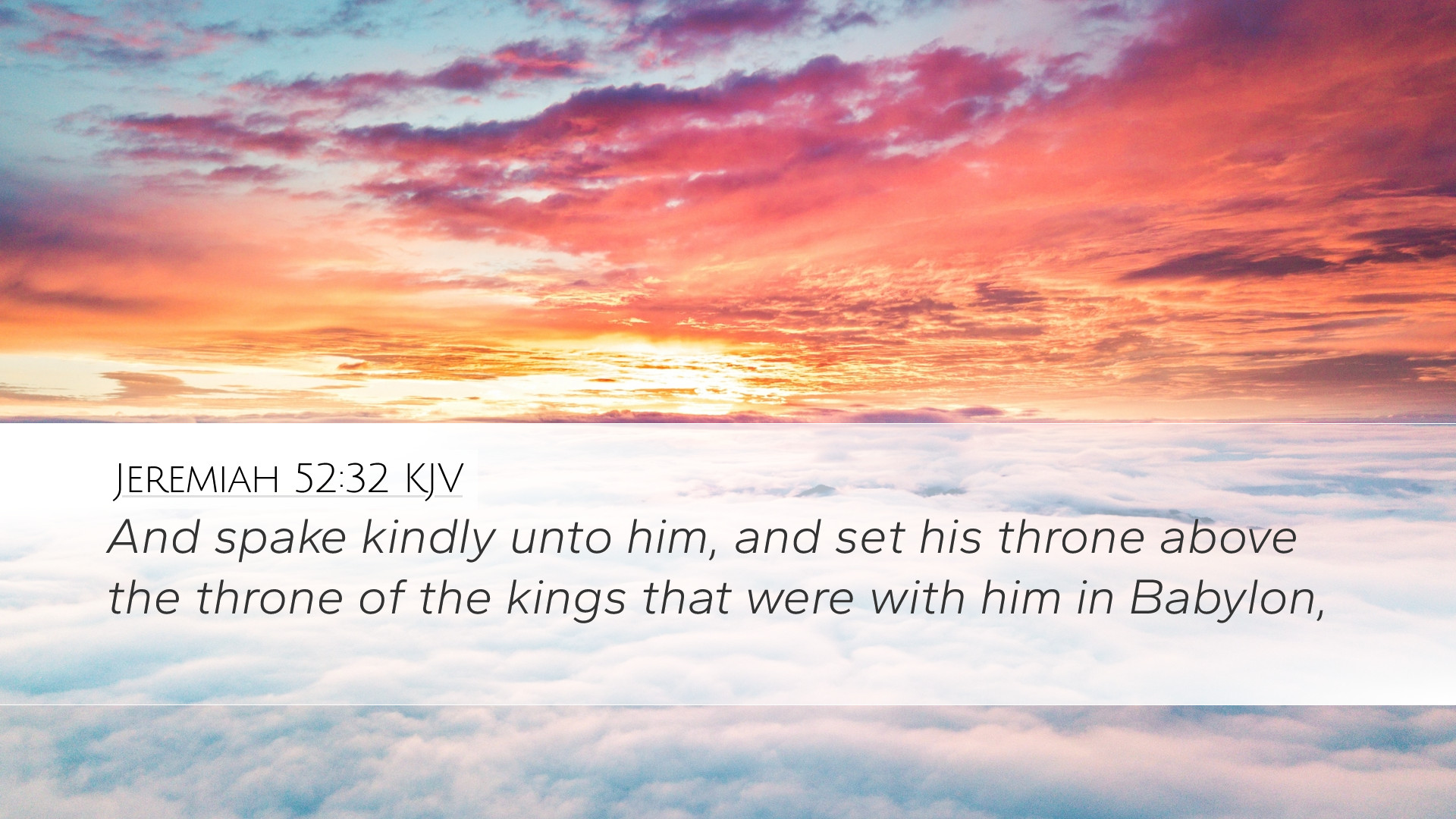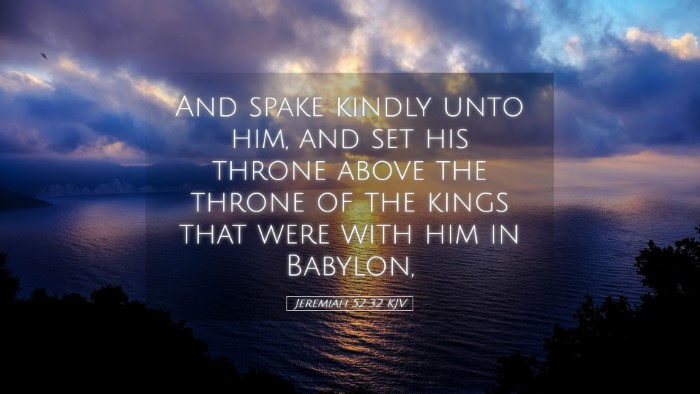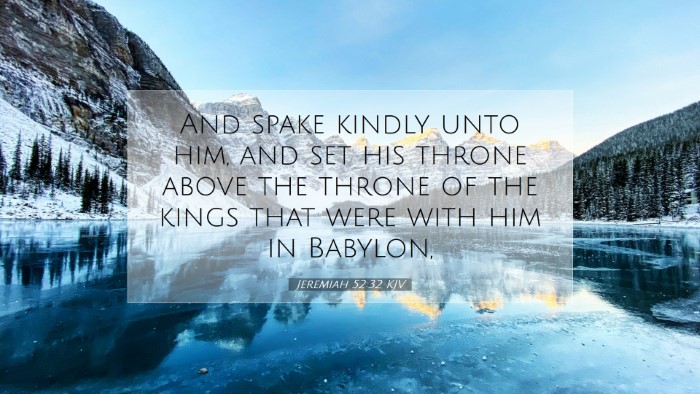Commentary on Jeremiah 52:32
The verse Jeremiah 52:32 states: "And he spake kindly to him, and set his throne above the thrones of the kings that were with him in Babylon." This passage, as the conclusion of the Book of Jeremiah, encapsulates the themes of mercy, restoration, and the providential care of God amidst judgment.
Contextual Background
Before diving into the specific commentary on this verse, it is crucial to understand its historical and theological context. This verse occurs at the end of the prophetic narrative concerning the destruction of Jerusalem and the exile of God’s people. Following the siege of Jerusalem, King Zedekiah’s reign came to a tragic end as he was taken captive by the Babylonians. The events leading up to this were marked by a series of warnings from the prophet Jeremiah, underscoring the rejection of God’s counsel and the dire consequences of such actions.
Insights from Public Domain Commentaries
Matthew Henry's Commentary
Matthew Henry highlights God's mercy in this passage. Despite Zedekiah’s sins and subsequent downfall, God allowed Zedekiah’s successor, Jehoiachin, to receive kindness from the Babylonian king, Evil-merodach. Henry emphasizes that this act of kindness serves as a testament to God’s overarching mercy. It illustrates how, despite the catastrophic consequences of sin, God's unfailing love and compassion provide a glimmer of hope.
- Divine Favor: Henry points out that Jehoiachin was regarded more favorably than others and was elevated to a significant position in Babylon, indicating that God had not completely forsaken His people.
- Symbol of Restoration: This elevation serves as a representation of future restoration, symbolizing that God’s plans for His people extend beyond judgment.
Albert Barnes' Commentary
Albert Barnes elaborates on the implications of the king’s ascension in Babylon. He suggests that this act was not only an acknowledgment of Jehoiachin but also a fulfillment of God’s promise regarding the survival of David’s lineage. Barnes explains that the act of kindness shown to Jehoiachin underscores a pivotal theological point: although the Davidic line faced judgment, God’s covenantal faithfulness remained intact.
- Covenantal Promise: Barnes reflects on the significance of the promise made to David, noting that even in exile, there remains a remnant that God protects and continues to bless.
- Lessons on Hope: This passage serves to remind believers that in the midst of despair, God’s sovereignty assures that His plans and purposes will endure.
Adam Clarke's Commentary
Adam Clarke provides a detailed exposition of the historical and cultural implications surrounding this verse. He elucidates the relationship between the Babylonian king Evil-merodach and Jehoiachin, noting the political motivations behind their interactions. Clarke emphasizes that the elevation of Jehoiachin to a throne above other kings was not merely an act of goodwill but strategically beneficial for the Babylonian regime.
- Political Dynamics: Clarke suggests that Evil-merodach sought to employ Jehoiachin as a puppet king to maintain stability among the exiled Jews, thereby showcasing the complex interplay between divine providence and human politics.
- Theological Reflection: Despite the political maneuvering, God’s hand is evident in the elevation of Jehoiachin, representing both human failure and divine sovereignty in history.
Theological Interpretation
The implications of Jeremiah 52:32 extend far beyond its historical context. It speaks volumes about the nature of God’s grace and mercy. Even when His people are subjected to judgment, God remains faithful to His promises. This theological truth is critical for pastors and theologians as they seek to communicate the message of hope amidst sin and its consequences.
- God's Faithfulness: The tension between divine punishment and mercy serves as a potent reminder of God's unwavering character. His plans continue to unfold through the trials His people face.
- Relevance to Modern Believers: The story of Jehoiachin is not only a historical account but a metaphor for every believer who may feel estranged or judged but can find solace in the kindness and mercy of God.
Application for Pastors and Theologians
In light of this profound insight from Jeremiah 52:32, pastors and theologians are encouraged to reflect on the following applications:
- Emphasizing God’s Mercy: Sermons should focus on the mercy of God that transcends our failures, offering the message of hope that no one is beyond redemption.
- Encouraging Resilience: Like Jehoiachin, believers are often called to navigate trials. It is vital to teach resilience and trust in God’s sovereignty even during dark hours.
- Fostering a Culture of Hope: Churches should cultivate an environment where individuals feel safe to express their struggles and seek restoration, embodying the reflected kindness shown in this passage.
Conclusion
Jeremiah 52:32 serves as a vital reminder of God's unfailing love and the hope of restoration that permeates the narrative of Scripture. It reflects the complexity of human circumstances while highlighting the faithfulness of God—an enduring theme that resonates deeply within the hearts of believers and scholars alike. As we dive into this rich text, let us be encouraged by the interplay of judgment and grace, driving us to a deeper understanding of God’s character.


